the wisdom of age
takes root to blossom
in crevices of the brain
emptied by letting go
—Terri Guillemets
the wisdom of age
takes root to blossom
in crevices of the brain
emptied by letting go
—Terri Guillemets
My stiff-spread arms
Break into sudden gesture;
My feet seize upon the rhythm;
My hands drag it upwards:
Thus I create the dance.
I drink of the red bowl of the sunlight:
I swim through seas of rain:
I dig my toes into earth:
I taste the smack of the wind:
I am myself:
I live.
The temples of the gods are forgotten or in ruins:
Professors are still arguing about the past and the future:
I am sick of reading marginal notes on life,
I am weary of following false banners:
I desire nothing more intensely or completely than this present;
There is nothing about me you are more likely to notice than my being:
Let me therefore rejoice silently,
A golden butterfly glancing against an unflecked wall.
—John Gould Fletcher (1886–1950), Irradiations, 1915
“Time has proved that the function of poetry is not to impart messages, but to explore the depths of emotion.
The poet is never a teacher, but always a learner. His poem is a venture at perilous discovery. The fact of writing is not the recording of something already known to the poet; it is his method of bringing to the light things that were previously in darkness for him.
The aim of poetry is to capture those rare moments of the poet’s experience when, for good or for evil, the consciousness of life sweeps through him like a flame… the moments when he becomes passionately aware of the crises of his spirit’s secret drama, and sees a pattern taking shape in the void, and words of utterance come singing to his lips.
Out of that dizzy instant he emerges, bewildered but excitedly hopeful, bringing with him his poem. Here, he says, is a curious glimmering thing that I discovered far down in the sea of my dimly conscious spirit: perhaps it will have a fascination for you, too; perhaps you, too, will see in its pale sphere some hint of the iridescent lights that played on its surface when in those vast deeps I found it.”
—Arthur Davison Ficke (1883–1945), “The Nature of Poetry,” 1926
pick out your fears
worries, anger, and hate
from the bag of stones you carry
and love, find yourself lifted by
the wings of featherweight faith
—Terri Guillemets
believing my wings were fragile and fractured
in my formidable forties, i abandoned
approaching fifty, i know my wings are strong
they just cannot lift so many heavy
—Terri Guillemets
shards of memory
jagged-edged
broken emotions —
wholeness
is the fossil
of childhood —
growing up
fractures
many things —
—Terri Guillemets
God completed my heart
then you finished it —
mortal combat style
—Terri Guillemets
Saturday:
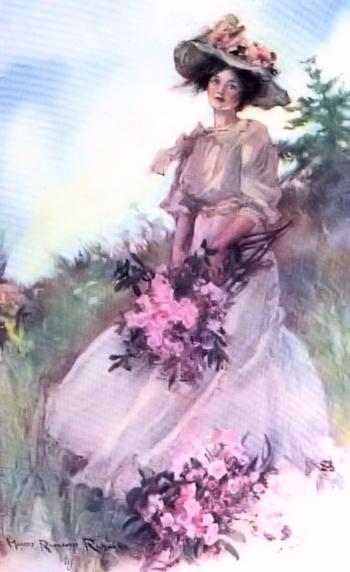
Sunday:
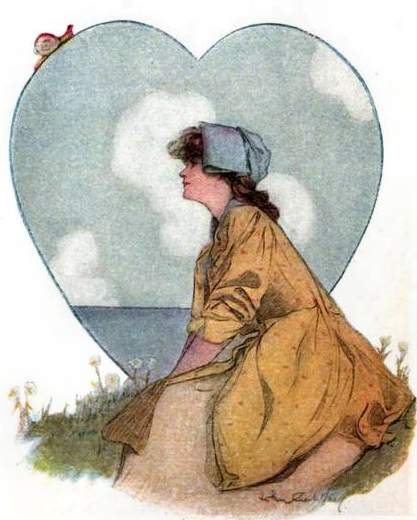
Monday:
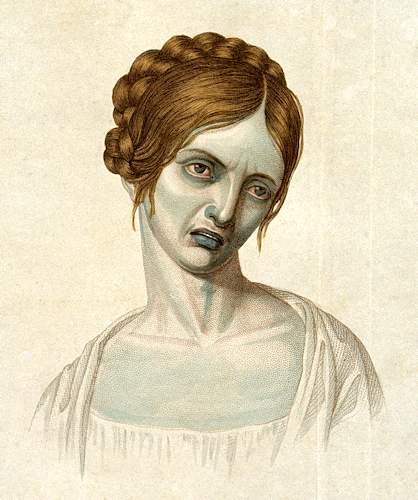
Tuesday:
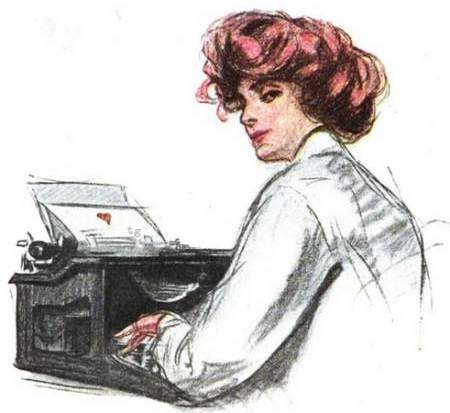
Wednesday:

Thursday:
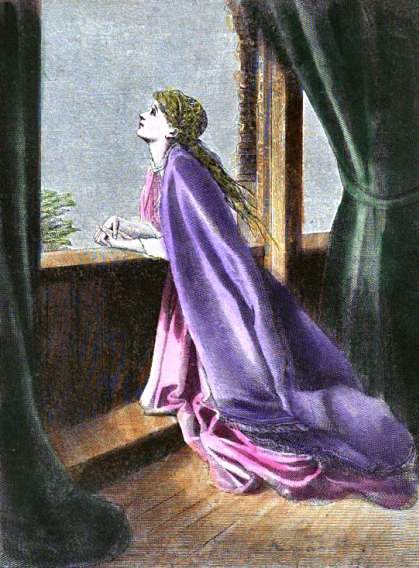
Friday:
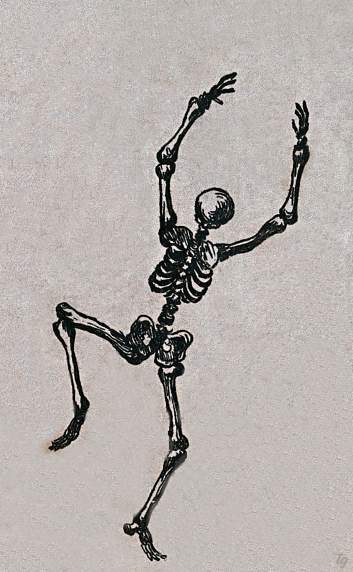
Images in the public domain, modified t.g.
• Saturday — Zandrie by Marian Edwards Richards, 1909, illustration by Harriet Roosevelt Richards, published by The Century Co., contributed by New York Public Library, digitized by Google Books, books.google.com
• Sunday — Happy Days by Oliver Herford, 1917, illustrated by John Cecil Clay, published by Mitchell Kennerley, Internet Archive, contributed by University of California Libraries, digitizing sponsor Microsoft, archive.org
• Monday — Wellcome Collection. ‘A young woman of Vienna who died of cholera, depicted four hours before death.’ Coloured stipple engraving, c.1831. wellcomecollection.org
• Tuesday — Happy Days by Oliver Herford, 1917, illustrated by John Cecil Clay, published by Mitchell Kennerley, Internet Archive, contributed by University of California Libraries, digitizing sponsor Microsoft, archive.org
• Wednesday — I got this from an old book years ago but haven’t yet been able to find my notes with the source; oops.
• Thursday — Woman in Sacred Song, compiled and edited by Eva Munson Smith, 1888 edition, published by Arthur E. Whitney, digitized by Google Books, books.google.com
• Friday — Wellcome Collection. ‘Skeletons dancing.’ Etching by R. Stamper after Christopher Sharp. 1700s. wellcomecollection.org
“The desert was quiet. The coyotes were not howling yet. I was my own howling coyote. Outwardly a comfortable-looking man in an
—J. B. Priestley (1894–1984), Midnight on the Desert: A Chapter of Autobiography, 1917
“On the floor of your mind, then — is it not this that makes you a poet? — rhythm keeps up its perpetual beat. Sometimes it seems to die down to nothing; it lets you eat, sleep, talk like other people. Then it swells again and rises and attempts to sweep all the contents of your mind into one dominant dance. Tonight is such an occasion. Although you are alone, and have taken one boot off and are about to undo the other, you cannot go on with the process of undressing, but must instantly write at the bidding of the dance. You snatch pen and paper; you hardly trouble to hold the one or to straighten the other. And while you write, while the first stanzas of the dance are being fastened down, I will withdraw a little and look out of the window. A woman passes, then a man; a car glides to a stop and then — but there is no need to say what I see out of the window, nor indeed is there time, for I am suddenly recalled from my observations by a cry of rage or despair. Your page is crumpled in a ball; your pen sticks upright by the nib in the carpet… You are rasped, jarred, thoroughly out of temper. And if I am to guess the reason, it is, I should say, that the rhythm which was opening and shutting with a force that sent shocks of excitement from your head to your heels has encountered some hard and hostile object upon which it has smashed itself to pieces. Something has worked in which cannot be made into poetry; some foreign body, angular, sharp-edged, gritty, has refused to join the dance…
The poet as I guess has strained himself to include an emotion that is not domesticated and acclimatized to poetry; the effort has thrown him off his balance; he rights himself… by a violent recourse to the poetical — he invokes the moon or the nightingale. Anyhow, the transition is sharp. The poem is cracked in the middle. Look, it comes apart in my hands: here is reality on one side, here is beauty on the other; and instead of acquiring a whole object rounded and entire, I am left with broken parts in my hands…”
—Virginia Woolf (1882–1941), letter to John Lehmann, 1931
Mother dear —
You worry about me
because I write sad poems —
But I promise you:
I am okay —
Writing purges my frustrations
and vents my steam
the pen is my psychiatrist
and ink my medicine —
When life feels off-balance
back to the writing board I go
I do not hide but seek
my emotions in words
and blot them on the paper
which blots it all out of my soul —
You see sad words, but to me
all my poems are happy
because creating them heals me —
Guaranteed, and believe me
because I love you so:
your daughter is just fine —
If ever I stop writing poems
that is when you should worry.
— ღ Terri
All these years
I thought ‘barren’
meant of the womb —
but now my body
has threatened me
with menopause
and I realize it
means of the heart.
—Terri Guillemets
I am searching for my feelings
through shelves of dusty books
can’t help but feel I’ve left them
in some forgotten ancient nooks
as if an author long before me
captured my emotions in his day
and saved them in fine poetry
for future me to find someway
—Terri Guillemets